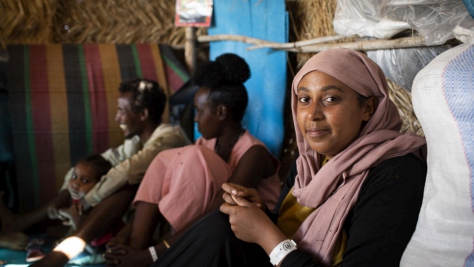Return of 2,400 Somali refugees leads to closing of third camp in Ethiopia
The voluntary return of more than 2,400 Somali refugees last week brings to more than 50,000 the number of voluntary repatriations last year and leads to the closing of a third refugee camp in Ethiopia.

ADDIS ABABA, Ethiopia, Jan. 2 (UNHCR) - The repatriation of thousands of Somali refugees from Ethiopia has continued at a steady pace, reflecting a more stable situation in parts of the east African country and leading to the closing of three of eight refugee camps.
Two convoys last week repatriated 2,412 people from Ethiopia's Daror camp to north-west Somalia, bringing the total number of refugees who returned home in 2001 to 50,216. The latest returnees received a nine-month food ration, plastic sheeting and blankets to help them restart their lives.
The Daror complex, which includes health clinics, schools, water systems and generators, and which once hosted 50,000 refugees, will be handed over by UNHCR to the local community.
Earlier last year, Teferiber and Dawarnaji camps were also closed.
Another estimated 67,000 Somalis who fled following the outbreak of widespread civil war a decade ago remain in five other camps in Ethiopia. More than half are expected to return home by June, but some 30,000 others from southern Somalia cannot be repatriated because the security situation in that part of the country remains unstable.
Related news and stories
Thousands of newly arrived Somali refugees in Ethiopia relocated to new settlement
Samira's Story
Drought brings life-threatening food shortages for refugees in Ethiopia
100,000 new Somali refugees arrive in Ethiopia in the past month, UN and partners are calling for urgent funding
UNHCR teams and partners rush assistance to some 100,000 newly arrived Somali refugees in hard-to-reach area of Ethiopia
As the Horn of Africa drought enters a sixth failed rainy season, UNHCR calls for urgent assistance
-

15by30 Roadmap - Coming together to achieve 15% enrolment by 2030 (visualized PDF)
23 Mar 2021 This PDF provides a visual summary of the 15by30 roadmap. It highlights where the strategy stems from, what the overall targets are and which actions need to be taken to achieve the goal to increase enrolment in higher education of young refugee women and men to 15% by 2030. -

Tertiary Education 15by30 roadmap - actions across the pathway (visualized PDF)
23 Mar 2021 Five key pathways facilitate access to higher education: national universities, the DAFI scholarship programme, technical and vocational education and training, connected higher education and complementary education pathways for admission to third countries. This PDF visualizes the key actions across each of these pathways – from strengthening partnerships to improving accessibility. -

Tertiary Education 15by30 Roadmap Agenda - Working Across the Five Pathways of Higher Education (visualized PDF)
23 Mar 2021 This PDF visualizes the different working steps that are part of the 15by30 roadmap agenda for higher education. -

UNHCR outraged by deadly attack against displaced population in Western Niger
23 Mar 2021 -

Uprooted in their own land: the internal displacement crisis
23 Mar 2021 With 45.9 million people displaced inside their own countries, a new data visualization reveals the scale of the issue, the latest trends and prospects for lasting solutions. -
Remarks to the 80th Session of the Standing Committee of the Executive Committee of the High Commissioner's Programme
23 Mar 2021 -

Bangladeshi authorities, aid agencies and refugee volunteers rush to respond as massive fire leaves some 45,000 Rohingya refugees without shelter
23 Mar 2021 -

Bain & Company
Bain & Company provides invaluable pro bono support to UNHCR on a range of strategic and organizational topics. It has advised UNHCR on the design and set-up of change management and business transformation capabilities. -

Better access to water improves lives for refugees and their hosts in Zimbabwe camp
22 Mar 2021 UNHCR, the UN Refugee Agency, and partners have improved water supply at Tongogara camp, in a project funded by the African Development Bank.
